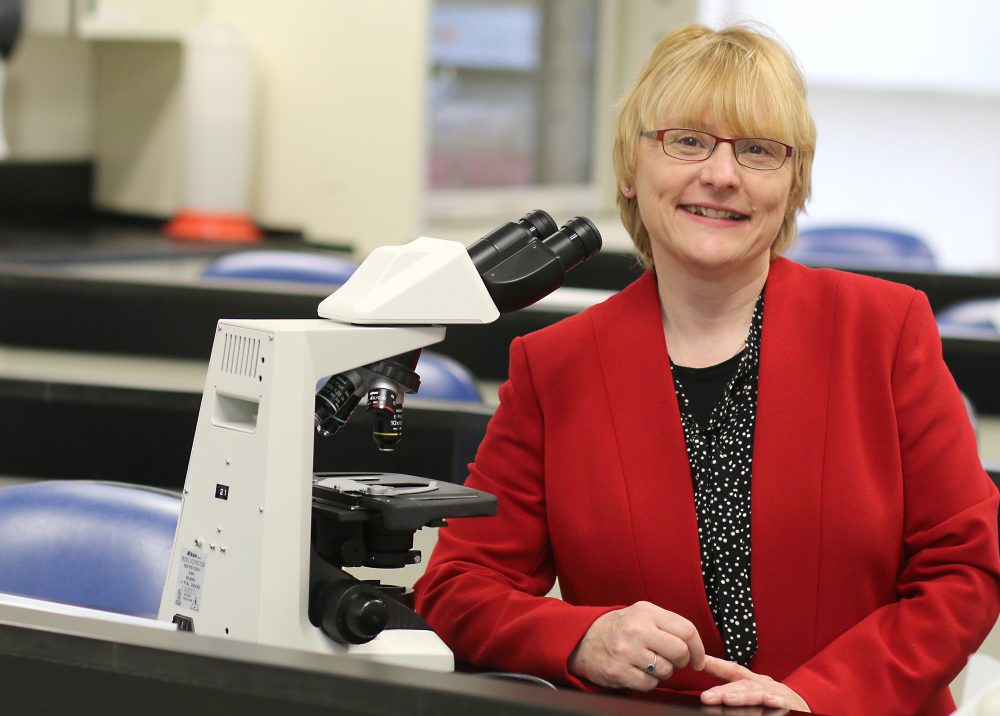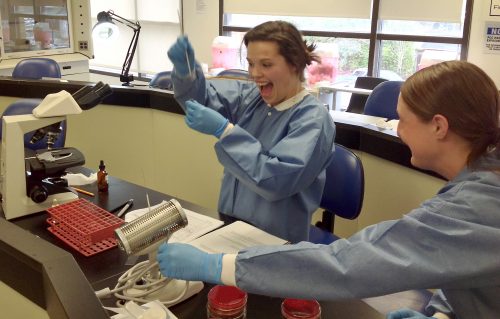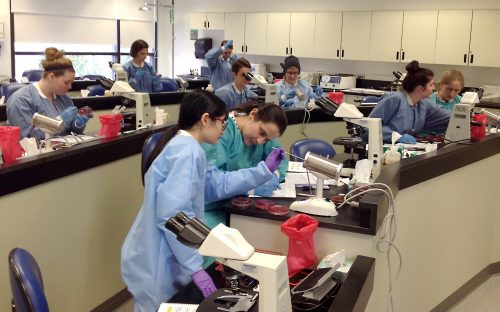This content was published: April 2, 2018. Phone numbers, email addresses, and other information may have changed.
Medical lab techs play hidden but crucial role in healthcare as PCC trains future workers
Photos and Story by Abe Proctor
 Most of us will hear some variation of this phrase at some point in our lives: “I’d like to send a sample over to the lab.”
Most of us will hear some variation of this phrase at some point in our lives: “I’d like to send a sample over to the lab.”
Or, “We’ll know more once we get the results back from the lab.”
This “Lab” is where physicians, researchers, and even criminal investigators obtain the key information that enables them to do their jobs. And the people who work in or staff the laboratory – aka medical laboratory technicians and scientists – play an essential behind-the-scenes role in everything from diagnosis to research to treatment.
“Laboratory technicians are a crucial link in the chain,” said Teresa Wolfe, chair of the Medical Laboratory Technology Program at Portland Community College’s Cascade Campus. “Physicians make 70 percent of their diagnoses based on lab results.”
The profession of medical laboratory technology requires a very specific skill set, said Wolfe, as well as a certain demeanor. The testing procedures in a medical lab are highly complex, involve technical equipment, and demand a commensurate level of focus and attention to detail, as well as an aptitude for math and chemistry.
 “The job tends to attract people who might be a little introverted and enjoy the complexity and the technical discipline of a laboratory,” Wolfe added.
“The job tends to attract people who might be a little introverted and enjoy the complexity and the technical discipline of a laboratory,” Wolfe added.
Lab technicians also need something else in order to be successful on the job – the right certification. PCC’s program awards an Associate of Applied Science: Medical Laboratory Technology degree after two years, and prepares students for the rigorous certification exam, administered by the American Society for Clinical Pathologists.
How well does PCC’s program prepare its students for the certification exam? Wolfe said that for the past four years, 100 percent of PCC students have passed the exam, compared to a 75 percent nationwide average. Once they’re on the job, graduates can expect to earn about $19-22 per hour in clinics, and $25 to $30 per hour in large hospitals for a starting wage. They can often earn more if they’re willing to work nights or weekend shifts.
The program admits a new cohort of students each fall, but it’s a good idea for would-be lab technicians to begin the process in the preceding December. There are a “fair number” of prerequisite courses, Wolfe said, that students may need to take before they begin the program proper. The application window opens in February of each year, and stays open through June.
 Students spend their first year in the lab at PCC, learning their way around a laboratory and becoming proficient with the wide range of equipment and procedures they’ll use on the job. Between their first and second years, students start training at the simulation lab at Legacy Good Samaritan Hospital – one of the program’s partners – where they begin work with real patient samples. Starting the final two terms of the program (winter and spring terms of the second year) students participate in clinical rotations at a number of partner labs around the city.
Students spend their first year in the lab at PCC, learning their way around a laboratory and becoming proficient with the wide range of equipment and procedures they’ll use on the job. Between their first and second years, students start training at the simulation lab at Legacy Good Samaritan Hospital – one of the program’s partners – where they begin work with real patient samples. Starting the final two terms of the program (winter and spring terms of the second year) students participate in clinical rotations at a number of partner labs around the city.
Once they’re on the job, lab technicians enjoy the advantage of being able to find work in a wide range of settings and industries, Wolfe said. Most people are familiar with labs based in hospitals or health clinics, but lab technicians can be found in public health labs, blood banks, public- and private-sector research facilities, and more.
It’s not difficult for technicians with a two-year degree to find work, she said, but some employers require a four-year certification (or, in some cases, a previous bachelor’s degree combined with work experience) for more specialized positions. Many PCC grads, she said, have gone on to earn a four-year degree after working in the field for a few years.
In addition to a good starting wage and a spectrum of workplace options, being a medical laboratory technician offers something that many careers don’t – the flexibility to work virtually wherever you want. Wolfe said that there is a significant and sustained demand for certified lab technicians, such that it’s not difficult to find a job most places in the United States.
“It’s comparable to nursing in terms of its flexibility,” said Wolfe. “You could go to any city, any state in the USA today and get a job tomorrow. Another bonus is that you don’t always need to work full-time in this job in order to get full benefits.”


That is interesting’ My name is Paige aka’ Lulu and I am from Guam, I’ve wished to get a career and I would like to make that step moving forward, when I was younger I didn’t have the time for myself due to family obligation caring for my children and now having 16 grandchildren and 2 grandchildren that kept me on hold. I have Prayed and Prayed when will I ever have the chance to afford it. Our income was a roller coaster with getting into a stable income” it’s unpredictable. If there is a program out there to help me with the cost it will be great to finally get a degree to provide for my family. GOD WILLING WITH HIM .ALL THINGS ARE POSSIBLE’
Sincerely, Paige